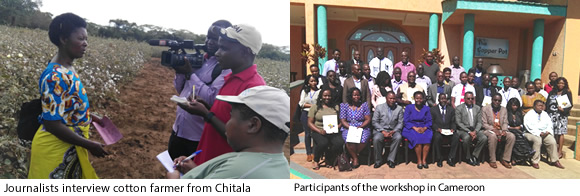
African Countries Launch the Global Report on Commercialized Biotech/GM Crops
June 21, 2017| |
The 2016 annual report on Global Status of Commercialized Biotech/GM Crops (ISAAA Brief 52) has been launched in Cameroon and Malawi. The report was also virtually launched in Nairobi, Kenya on June 13, 2017.
In Cameroon, the report was presented during the African Biosafety Service Providers coordination meeting in Yaounde on May 4, 2017 and attended by workshop participants and 10 Cameroonian journalists. It was presided over by Dr. David Mbah, Executive Secretary of the Cameroon Academy of Sciences. Dr. Mbah said that the country "chose biotech cotton trials as a starting point so that people get a chance to see that there is nothing to fear because the scientific and regulatory process is rigorous." He added that once Cameroonians had confidence in the technology, more biotech crops will be introduced in the country.
In Malawi, Dr. Albert Changaya, Controller of Agricultural Extension and Technical Services urged the journalists to "convey messages based on scientific evidence and facts so that governments can hasten decision making." He allayed fears on GM crops, stating that the technology provided a viable tool in improving agricultural productivity. The launch took place on June 7, 2017 during a regional media training workshop organized by Malawi's Department of Agricultural Research Services, COMESA and ISAAA. It was attended by 40 journalists from Malawi, Swaziland, Zambia, and Zimbabwe, who also had an opportunity to visit a Bt cotton varietal trial in Central Malawi. "We believe in our scientists and we have seen the prospects of Bt cotton, which is producing more than 30 bolls compared to just 6-8 bolls per plant you saw in our farmers from traditional cotton" lamented Jennifer, a cotton farmer in Chitala. "Farmers are the best judges and will be the first to reject the technology if it does not deliver. What they need is the opportunity to practically make that decision," said Dr. Getachew Belay, COMESA's Senior Biotechnology Policy Adviser. Malawi granted its first environmental release approval for Bt cotton in 2016.
For Africa, 2016 was the 19th year of commercialization of biotech crops. A total of 13 countries, up from 11 in 2015 either planted, conducted trials or transitioned to granting approvals for general release of various biotech crops. South Africa and Sudan grew a total of 2.8 million hectares of biotech crops out of the 185.1 million hectares grown worldwide.

For more information, contact the ISAAA AfriCenter Director, Dr. Margaret Karembu: mkarembu@isaaa.org.
| |
Biotech Updates is a weekly newsletter of ISAAA, a not-for-profit organization. It is distributed for free to over 22,000 subscribers worldwide to inform them about the key developments in biosciences, especially in biotechnology. Your support will help us in our mission to feed the world with knowledge. You can help by donating as little as $10.
-
See more articles:
-
News from Around the World
- GM Crop Approvals Boost Bioengineered Foods Market, Report
- African Countries Launch the Global Report on Commercialized Biotech/GM Crops
- Student to Boost Vitamin A Content of Chickpea
- Research Found Way to Improve Nitrogen Fixation in Legumes
- Farmer Perspective Brought to Biotech Regulatory Discussions
- American Soybean Association: Biotech Essential to Feed 9.7B People in 2050
- China Approves Import of GM Crops from the U.S.
- Heat Tolerant Lentils Endure Increasing Global Temperatures
- Chinese Academy of Sciences Partners with Bayer to Improve Wheat Yields
- Researchers Unlock the Genetic Secrets of Plant Cell Walls
-
Research Highlights
- Researchers Study Cotton Kinesin Gene GhKIS13A1
- Overexpression of a Blueberry DDF1 Gene Confers Increased Tolerance to Freezing
-
Beyond Crop Biotech
- Kenya's Imaginature Seeks Approval for Field Trial of GE Baby's Breath Flowers
- Defense Secret of E. coli Revealed
-
Plant
- Multi-Site Genome Editing in Cotton using CRISPR-Cas9 System
-
Read the latest: - Biotech Updates (February 18, 2026)
- Gene Editing Supplement (January 28, 2026)
- Gene Drive Supplement (February 22, 2023)
-
Subscribe to BU: - Share
- Tweet
